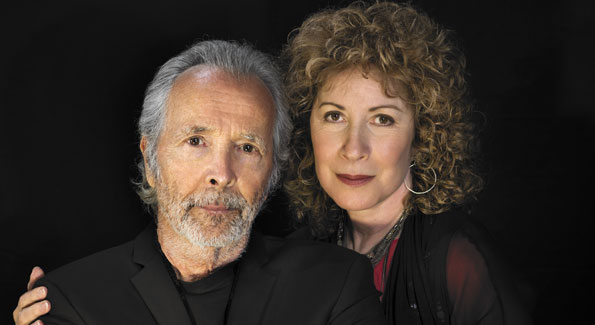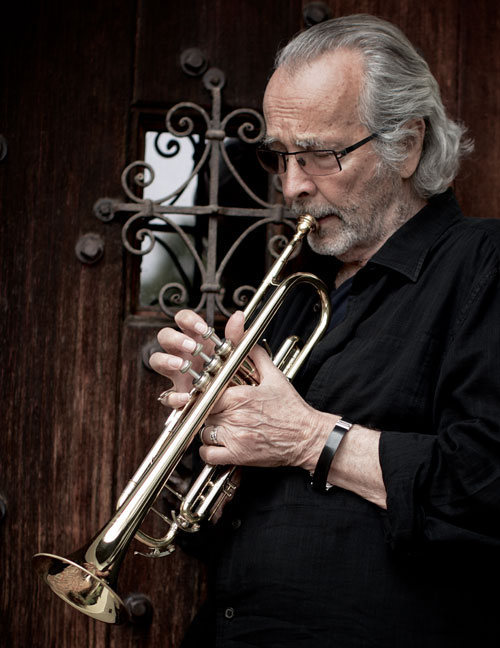A living legend is still rising, still creating, and still very much Herb Alpert.

Grammy-winning couple Herb Alpert and wife Lani Hall appear at the Birchmere. (Photo courtesy Herb Alpert)
Ah, the timeless sounds of childhood. Crickets and peepers singing in the woods. Those chimes out on the back porch. My father calling out across the neighborhood to come on home for dinner. Boistrous laughter from the kitchen.
Oh yes…and the music of Herb Alpert.
No sound was more part of it all than Herb Alpert’s sound coming from the phonograph. Like The Beatles, his was a sound of excitement, but also one of comfort, of security, of home. And all these years later, Herb Alpert thinks he knows what it was that made his and others’ music special, that made it timeless, a part of people’s life fabric.
“After recording (The Lonely Bull) in 1967 and it becoming a big hit, I got this fan letter from a lady in Germany who said, ‘Thanks for taking me on this vicarious ride,'” Alpert told me from his home in Malibu. “Vivid is what I’ve always tried to do, I tried to make visual music. There’s a certain honesty thread that runs through all really good artists, and I think about that all the time. I try to make music that’s real, music that’s coming out in an organic and honest way. That’s the way I’ve always approached it.”
Alpert is still irrefutably an American treasure, a vital and still-working world-class musician with an innate ability to create and discover music that deeply resonates, that slips inside us, and doesn’t let go. “The Lonely Bull” was the first time I ever heard what a bullfight might sound like. My first memory of “Spanish Flea” was my Mom dancing around the living room, not “The Dating Game” theme just yet. And “A Taste of Honey” signaled my parent’s cocktail hour. The list goes on and the songs remain embedded inside me. At the time, these Tijuana Brass records were eclipsing both The Beatles and Dylan on the charts — no small feat. But why was the Brass resonating so deeply with people then?
“There was no ‘Brass’ per se, I was using musicians of my choice from The Lonely Bull through Whipped Cream and Other Delights,” said Alpert. “But I think it was the choice of my material, the sound of my horn, and it was also timing. I think if we tried that in today’s environment, I don’t think the Brass would have happened.”
Alpert, 79, is keenly aware even today of the moment when his life changed forever. It’s a memory and a passion that drives his many generous philanthropic efforts, including The Herb Alpert Foundation which he founded in 1982, as well as other mostly music-related charitable endeavors that concentrate on giving kids who might not have the opportunity a chance to pursue music. “I always felt that success is not only what you achieve, but also what you do to help others to achieve,” Alpert said. “I don’t know, it’s in my DNA.”
It was during a music appreciation class — which he laments are few and far between today — when an 8-year-old Alpert picked up a trumpet from a table full of instruments.
“My life dramatically changed because of that,” he said. “I think it’s an important ingredient for all kids to have that experience, not necessarily to pursue a musical career, but just to have that experience creating. If you can find your own balance and find your own creativity and appreciate that, I think you learn to appreciate others as well. I think it’s a win-win.”
This kid from East L.A. with the matinee idol looks put down the trumpet just for a minute when he was 18 to try out acting, which included an uncredited bit part in The Ten Commandments. “It was pretty amazing watching Cecil B. Demille, and how they put that whole thing together, he had five guys hanging around him at all times. One guy was walking behind him with just a stool in case he wanted to sit down. But I realized at one point that I really didn’t have it, I just did not have that thing that I feel really great actors have, so I bowed out of that and got back into…well, I was always playing the trumpet, that’s how I was earning a living, but I realized that acting really wasn’t for me.”
He began an unprecedented run of success, including five number-one albums, a few Grammys and millions of records sold. He disbanded the Tijuana Brass in 1969 but reformed a couple times and was able to perpetuate the band’s popularity as years passed, even as he became a successful solo artist.
As his musical star ascended, so did his reputation as a music mogul. Started as a way to promote and distribute The Lonely Bull, Alpert’s A&M Records became a label juggernaut during its heyday. With a roster that included The Carpenters, Cat Stevens, The Police, Sting, Human League, Peter Frampton, Bryan Adams, Janet Jackson and other superstars, he and partner Jerry Moss earned the rare distinction of placing singles in the Top 10 in the ’60s, ’70s and ’80s.
“We tried to pick music we would have purchased ourselves,” Alpert said. “We always had great artists, and our pursuit wasn’t to find the beat of the week. We weren’t trying to duplicate what was on the charts. We were trying to do something a little bit left of center. We established an environment at A&M, and it was beautiful because we had great artists calling us wanting to record for us, it was not like we were soliciting. When we felt we were losing some of that momentum, it was time for us to go.”
Alpert and Moss sold A&M for $500 million in 1987, and Alpert never really looked back. He has continued to create at a dizzying pace, whether with his horn (he won a Grammy in 2014 for his 2013 record Steppin’ Out and recently released his latest album In The Mood a few weeks ago), with his hands (he’s been an exhibiting artist and sculptor for 40 years) as well as his remarkable savvy in knowing what works (he was a producer of the Tony Award-winning Angels in America). He also received a National Medal of the Arts award from President Barack Obama in 2013 and has a star on the Hollywood Walk of Fame.
But it’s the painting and sculpting that is the most direct parallel to his musical synthesis, something that moves and shakes him in the same dramatic way.
“I’ve been painting for over 40 years now, and I get that same high when I find a piece that really works, and the same low when I’m in the middle of something that doesn’t look very good,” he said. “It’s a high-and-low game. I mean, the trumpet’s the same way. I’m recording and I sometimes record something that is just not working for whatever reason, and can’t seem to find the key, until an ‘a-ha’ happens, and then I’m starting to feel good again. And for some reason I’m playing better than ever, and I’m enjoying it just as much as I did in the early days. I’m getting more for less effort.”
Alpert’s greatest treasure, however, is his wife Lani Hall, whom he met in 1966 when she sang lead with Sergio Mendes and Brazil 66 (you remember “Mas Que Nada”? Yep, that’s her). The couple has been married for more than 40 years. A Grammy winner herself, Hall is currently on tour with her husband and will be joining him when he plays the Birchmere on October 13.
The musician is honest about not being ready for marriage the first time around to wife Sharon from 1956-1971. Yet he has certainly found true love with his longtime bride and musical partner.
“I was like 21 when I married my first wife, but emotionally I don’t think I was ready,” Albert confides. “I just didn’t have a clear picture of what marriage was all about. But I’m fine. I got really lucky with Lani. She’s beautiful, she has a way of seeing the truth. She’s an unusual lady, and she’s tremendously talented.”
So Herb Alpert continues onward, creating beautiful art and gracing the world with his immense talent and sincere conviction. But it always comes back to the music, something Alpert thinks transcends any differences we in this world may have.
“I believe in music diplomacy, I think it’s a great way to bring people from various backgrounds together,” he said. “I could be playing in any part of the world with various types of musicians from different countries and someone can say, ‘Let’s play the blues!’ And you know, everybody’s in.”
Herb Alpert with special guest Lani Hall performs October 13, 2014 at the Birchmere, 3701 Mt. Vernon Ave., Alexandria, VA 22305. For tickets, click here.
Steve Houk writes about local and national music luminaries for WashingtonLife.com and his own blog at midliferocker.wordpress.com. He is also lead singer for the successful Northern Virginia classic rock cover band Second Wind.





